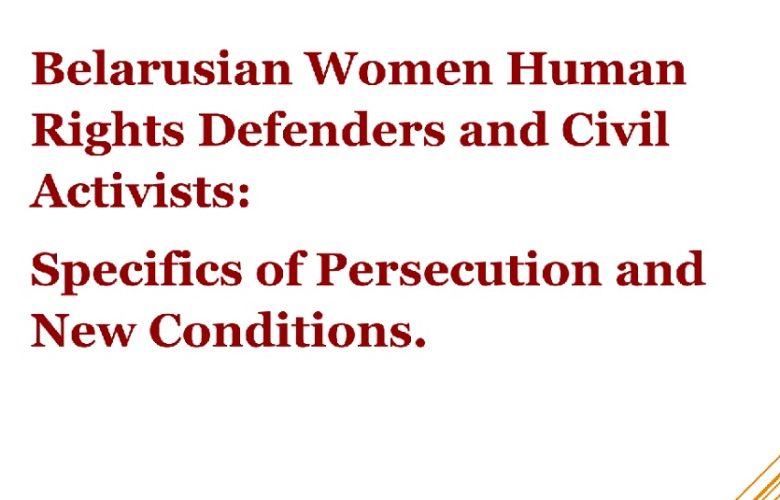Belarusian Women Human Rights Defenders and Civil Activists: Specifics of Persecution and New Conditions
INTRODUCTION
Women human rights defenders and civil activists contribute to protection and promotion of human rights in Belarus, and not only of gender agenda. Like all human rights defenders, they are harassed by the authorities. But they as well face gender-based problems due to the fact that they are persecuted not only because of their work, but also because of their identity.
Discrimination against women, including gender-based violence, is a problem of Belarusian society. The concept of discrimination against women, as defined in Article 1 of the Convention on the Elimination of All Forms of Discrimination against Women, includes gender-based violence (i.e., «violence that is directed against a woman because she is a woman or that affects women disproportionately») and such discrimination constitutes a violation of women’s human rights[1].
The political crisis and repression following the 2020 presidential election greatly affected women human rights defenders and civil activists, particularly in relation to their rights to freedom of assembly, association, and expression. Many have been subjected to intimidation, arbitrary detention, inhuman and degrading treatment, etc. The fact that women in Belarus tend to have the primary care of children and elderly relatives makes them more vulnerable than men. Liquidation of organizations whose purpose was to protect and promote women’s rights has become a form of persecution of women active in civil society and has also deprived them of an effective tool to receive assistance.
Women human rights defenders and civil society activists have had to act in the face of discrimination, stigmatization, lack of understanding by their loved ones, and specific threats (such as sexual bullying or slander based on perception of social norms related to gender or sexuality).
Moreover, women human rights defenders and civil activists are more subject to intersecting discrimination than their male colleagues — this is the discrimination on various grounds combined with a gender factor.
Disasters and conflicts negatively and disproportionately affect women. At the same time, women are often the first to help others and are responsible for the well-being of their families and communities.
Lawtrend conducted this research to identify the specifics of persecution of women human rights defenders and civil activists in Belarus in the context of their exercise of civil rights in the aftermath of the 2020 presidential elections. This should allow to identify and analyze the specific risks, challenges, and restrictions they face in order to understand and take into account how women involved in civic activism suffer in the broader contexts of violence and discrimination in Belarus, and in turn to contribute to better developing strategies and mechanisms to protect and support Belarusian women human rights defenders and civil activists.
[1] General recommendation of the Committee on the Elimination of Discrimination against Women No. 19 (Eleventh session, 1992): Violence against women, https://www.un.org/womenwatch/daw/cedaw/recommendations/recomm.htm

